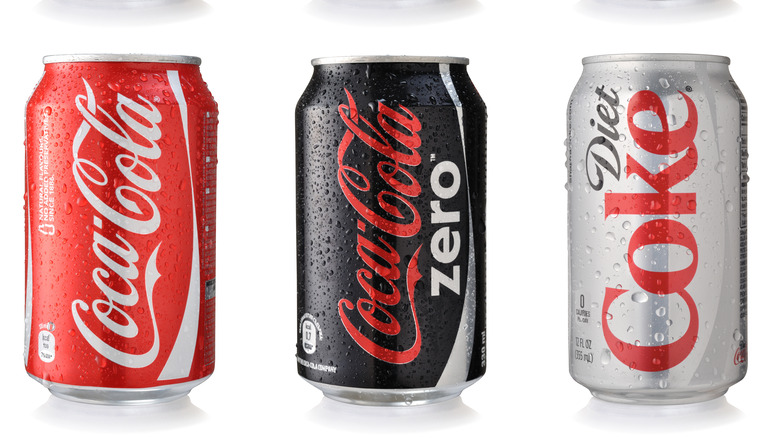Coke Zero Vs Diet Coke: Is There A Nutritional Difference?
In an effort to eat healthier, one of the first things to go is often the sugar. Swapping Coca-Cola for a can of sugar-free Coke Zero or Diet Coke is easy enough, but is one a better swap to make than the other? Of the two, Diet Coke has been sold for a longer period of time, having first hit store shelves in 1982, per CBS News. It took less than a year for the beverage to become the top diet soft drink, and in 1984, it became the overall third top-selling soft drink in the United States, according to Coke Solutions. A little more than 25 years later, Diet Coke became the no. 2 soft drink in the country (via Newsweek). Coke Zero, however, didn't make the top 10 biggest-selling sodas on Newsweek's list.
Coke Zero was launched in 2005, per The Coca-Cola Company. In 2017, the beverage became known as Coca-Cola Zero Sugar in order to promote how the beverage tastes like Coca-Cola Classic but without the sugar. Coca-Cola says it will continue to produce low-sugar products. In 2021, 28% of the company's sales were even in the low or no calorie division.
The main differences
There are three main differences between Diet Coke and Coke Zero: flavor, amount of caffeine, and type of sugar replacements, according to MedicineNet. While both Diet Coke and Coke Zero do not contain sugar or calories, they each have their unique taste. Coke Zero tastes similar to the original Coca-Cola because they share the same flavor bases, while Diet Coke uses different flavors.
The amount of caffeine also differs between the two with Diet Coke containing more. According to Caffeine Content Hub, Diet Coke has 46 mg of caffeine per 12-ounce can, compared to Coke Zero's 34 mg per 12-ounce can. The latter is the same amount as Coca-Cola Classic, which has 34 mg per 12-ounce can, but the classic version also has 39 grams of sugar. To sweeten Diet Coke, The Coca-Cola Company uses artificial sweetener aspartame. Coke Zero is also sweetened with aspartame, as well as acesulfame potassium (Ace-K). Medical News Today describes that Ace-K is often used in conjunction with other sweeteners, like aspartame, in order to give the beverage or food item a less-bitter aftertaste.
Based on the contents of Diet Coke and Coke Zero, MedicineNet contends that neither soda is a better pick for health reasons. So, ultimately it comes down to personal preference, but if you are looking to lose weight or have diabetes and want to drink soda, MedicineNet recommends to simply go with a sugar-free can of soda.

